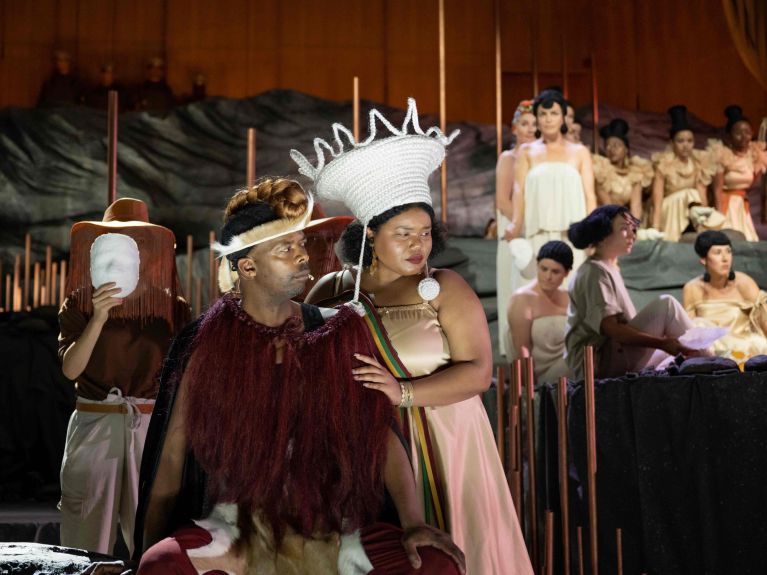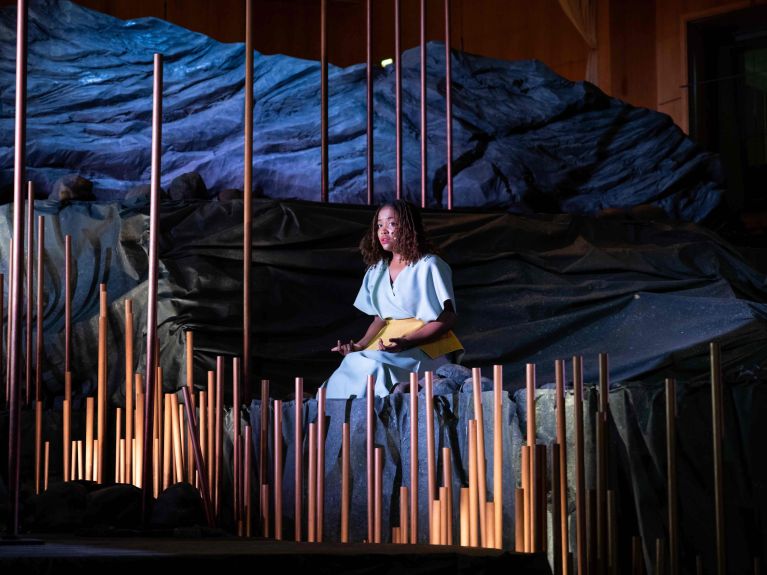“Emotions need delicate handling”
An opera about the history of Germany and Namibia. Director Kim Mira Meyer tells us about this Namibian-German partnership.


Kim Mira Meyer, how did “Chief Hijangua” come to be Namibia’s first opera?
It was the wish of the composer and conductor Eslon Hindundu, who developed the story with the German librettist Nikolaus Frei. There is no tradition of opera in Namibia as there is in Europe. So Eslon wanted something like it for his own country.
What is the opera all about?
A Namibian prince struggles to cope with the hierarchical structures of his family, and is in love with a woman he is not allowed to marry. He runs away and ends up in among German missionaries, where he learns the language and how to shoot, but he still doesn’t quite feel at home. He returns and is pursued by the Germans who capture his village. The opera comes to a dramatic conclusion. It relates the beginning of the colonial history between Germany and Namibia.
Dieses YouTube-Video kann in einem neuen Tab abgespielt werden
YouTube öffnenThird party content
We use YouTube to embed content that may collect data about your activity. Please review the details and accept the service to see this content.
Open consent formWhat inspired you to get involved?
My friendship with Eslon. We met at the Immling Opera Festival in 2019 and we wanted to work on a project together, so I set up Momentbühne for that purpose. Our funding comes from Siemens Arts and the Federal Foreign Office, among others. Three years later, we staged the premiere in Namibia. That was when our dream came to fruition. Shortly afterwards we found out we could bring the production to the Haus des Rundfunks in Berlin, with support from the Lotto Stiftung and the Senate of Berlin.
For us it was always important to be able to talk about cultural differences in a way that was open and without value judgements.
One hundred people are involved, on-stage and off. How did the team come together?
I looked for people in Germany and Eslon recruited people in Namibia and South Africa, which is where he went to university. We rehearsed in Munich, Cape Town and Windhoek. It was a marathon, but because everyone really wanted it, it worked. Discussions have to be part of a project like this. For us it was always important to be able to talk about cultural differences in a way that was open and without value judgements. When you’re working on an opera there are a lot of emotions at play that require delicate handling, and flat hierarchies, too.
How did you deal with the historical material?
As a team we decided to quote from history but to create our own artistic world. The issue of colonialism is so sensitive, so we worked collaboratively and all teams included Namibians and Germans. We wanted to approach the topic from all directions.
What challenges did you face?
As a German director, I was worried about cultural appropriation. My co-director Michael Pulse and I travelled around Namibia where we talked to people and collected props. The Namibian team were concerned not to reduce the country to its colonial history. I was unsure about putting baskets on stage, but Michael wanted to use them to represent Namibian culture. We really dug into the history but at the same time tried to find a more abstract approach of dealing with issues like genocide. We used an installation by the Namibian artist Isabel Katjavivi, for example, which employs masks to give a face to those who died.
The singers taught each other their own languages.
Namibian singers learned German for the opera, and German singers learned Otjiherero. That doesn’t sound easy.
It was part of what we shared with one another. We also cast roles regardless of a singer’s skin colour. The singers taught each other their own languages. In the music you can hear how many cultures there are in this opera: there are influences from classical music and Namibian rhythms, too.
How have audiences responded to the opera?
The premiere in Namibia was a great success and the mood in Germany was good, too. We’re now working on a chamber version which we want to perform in both countries. There’s no conservatoire for classical singing in Namibia. We want to set up structures to promote artists so that something lasting emerges. At Momentbühne we’re already working on our next project.

Can you give us a hint at what it’s about?
Our new project is called “People of Song”. The premiere is to take place in Namibia in 2025 and the first European performance is to be in Berlin in 2026. This time we don’t want to pin ourselves down to opera. We may create our own form. Again, though, we’re focusing on reappraising colonial history. We know what happened in Namibia, but we don’t want to point fingers. We want to look towards the future together. To that end we have set up a Namibian-German collective to develop a story. One thing we learned from “Chief Hijangua” is that the more you talk to each other, the better.



